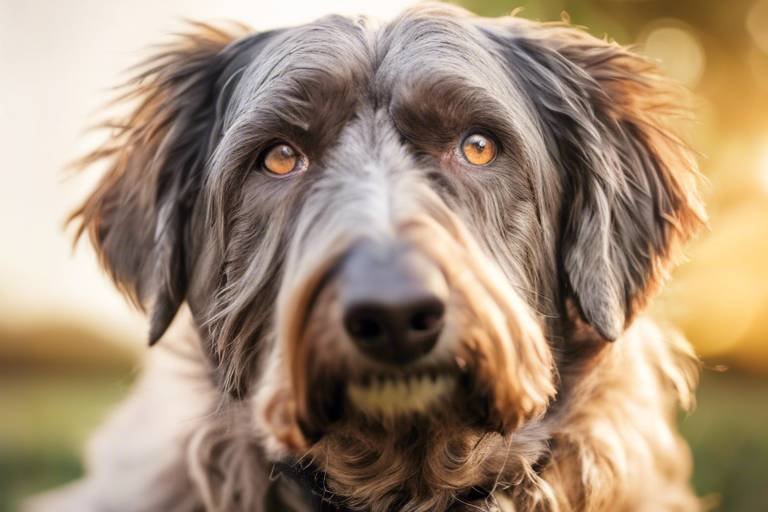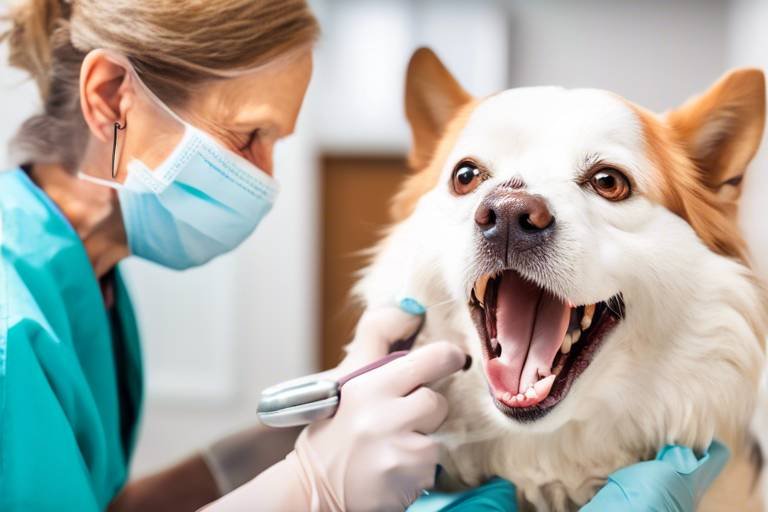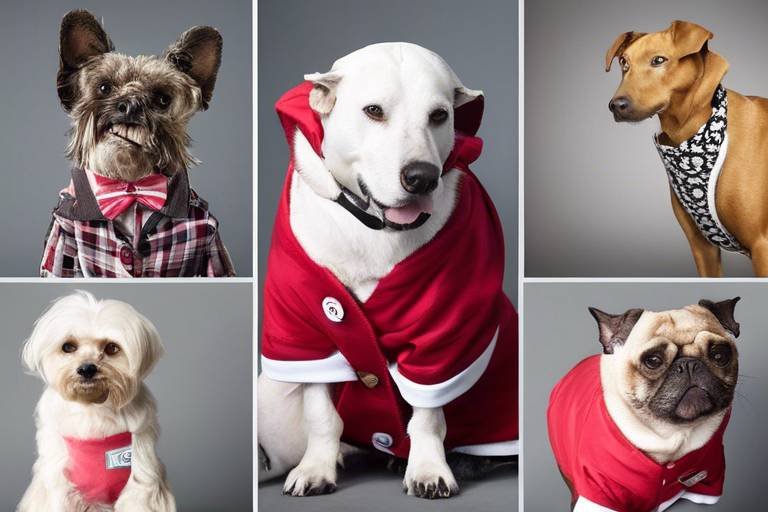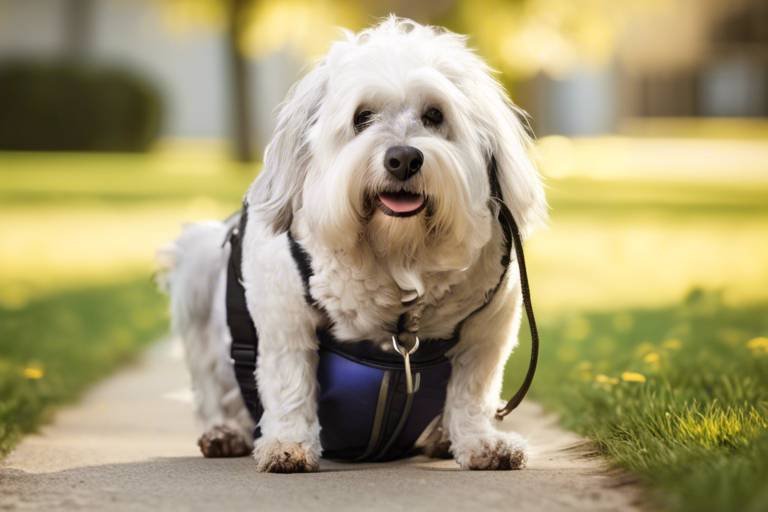How to Help Your Senior Pet Cope with Life Changes
As our furry friends grow older, they face a myriad of changes that can affect their overall well-being. These transitions can be as simple as moving to a new home, experiencing changes in the family dynamic, or even just the natural aging process. Understanding how to support your senior pet during these times is essential for ensuring their comfort and happiness. Just like us, pets can feel the stress of change, and it’s up to us to help them navigate these challenges. So, how can we make this journey smoother for them? Let’s dive into some effective strategies!
First and foremost, it’s important to recognize that as pets age, their physical and emotional needs evolve. This means that what worked for them in their younger years may no longer be suitable. For instance, senior pets often experience decreased mobility, changes in vision or hearing, and even alterations in their temperament. By being observant and empathetic, you can identify these shifts and tailor your care accordingly. Have you noticed your pet hesitating to jump onto the couch? Or perhaps they seem more anxious than usual? These are signs that they may need your support in new ways.
One of the best things you can do for your senior pet is to create a safe and comfortable living space. This doesn’t have to involve a complete overhaul of your home; rather, simple adjustments can make a world of difference. For example, consider their sleeping arrangements. Providing a cozy, accessible sleeping area can help senior pets rest better. Think about investing in orthopedic beds or adding soft blankets to support their joints. A little comfort goes a long way!
Have you ever tried to sleep on a hard surface? It’s not pleasant! Senior pets deserve a comfortable place to rest, too. By ensuring their sleeping area is not only cozy but also easy to access, you can help them get the quality sleep they need. Remember, a well-rested pet is a happy pet!
Another key aspect of creating a comfortable environment is minimizing noise and disturbances. As pets age, they may become more sensitive to sounds. This means that loud music, barking dogs, or even the clatter of pots and pans can be unsettling. Consider creating a peaceful sanctuary for them, away from the hustle and bustle of daily life. A quiet corner with their favorite blanket can be a perfect retreat!
Accessibility is vital for senior pets. Make sure their food, water, and litter boxes are within easy reach to reduce stress and encourage independence. Imagine having to struggle to get to your essentials every day—frustrating, right? By ensuring that everything they need is conveniently located, you can help them feel more at ease in their environment.
As pets age, their dietary requirements change too. It’s crucial to consult with a veterinarian about the right nutrition for your senior pet. This can help manage health issues and maintain their energy levels. Think of it as adjusting the fuel for a classic car; the right ingredients will keep it running smoothly!
Routine veterinary visits are essential for monitoring the health of senior pets. Just like we need regular check-ups to catch potential health issues early, our pets do too. These visits can help ensure they receive appropriate care and keep them feeling their best. Remember, prevention is always better than cure!
Keeping up with vaccinations and preventive care is crucial for senior pets. This helps protect them from diseases and ensures they remain healthy and active. It’s like giving them a shield against the world!
Many senior pets face chronic health issues, and understanding how to manage these conditions can significantly improve their quality of life. Regular communication with your veterinarian can provide insights into the best ways to keep your pet comfortable and happy. Think of it as being their personal health coach!
Mental stimulation is vital for senior pets to keep their minds sharp. Engaging activities can help reduce anxiety and improve their overall well-being during life transitions. Just like we enjoy puzzles or reading, pets thrive on challenges too!
Providing interactive toys and games can encourage physical and mental activity. This keeps senior pets entertained and engaged, promoting a healthier lifestyle. It’s not just playtime; it’s a workout for their minds and bodies!
Establishing a consistent routine can provide comfort and stability for senior pets. Familiar schedules help reduce anxiety and make life changes easier for them to navigate. Think of it as a comforting rhythm in their day—something they can rely on.
- How can I tell if my senior pet is stressed? Look for signs like excessive barking, hiding, changes in eating habits, or unusual aggression.
- What type of diet is best for senior pets? Consult your veterinarian for a diet rich in nutrients tailored to your pet’s specific health needs.
- How often should I take my senior pet to the vet? Regular check-ups every six months are recommended for senior pets to catch any potential issues early.
- Can I give my senior pet supplements? Yes, but always consult your veterinarian before introducing any new supplements to ensure they are safe and beneficial.
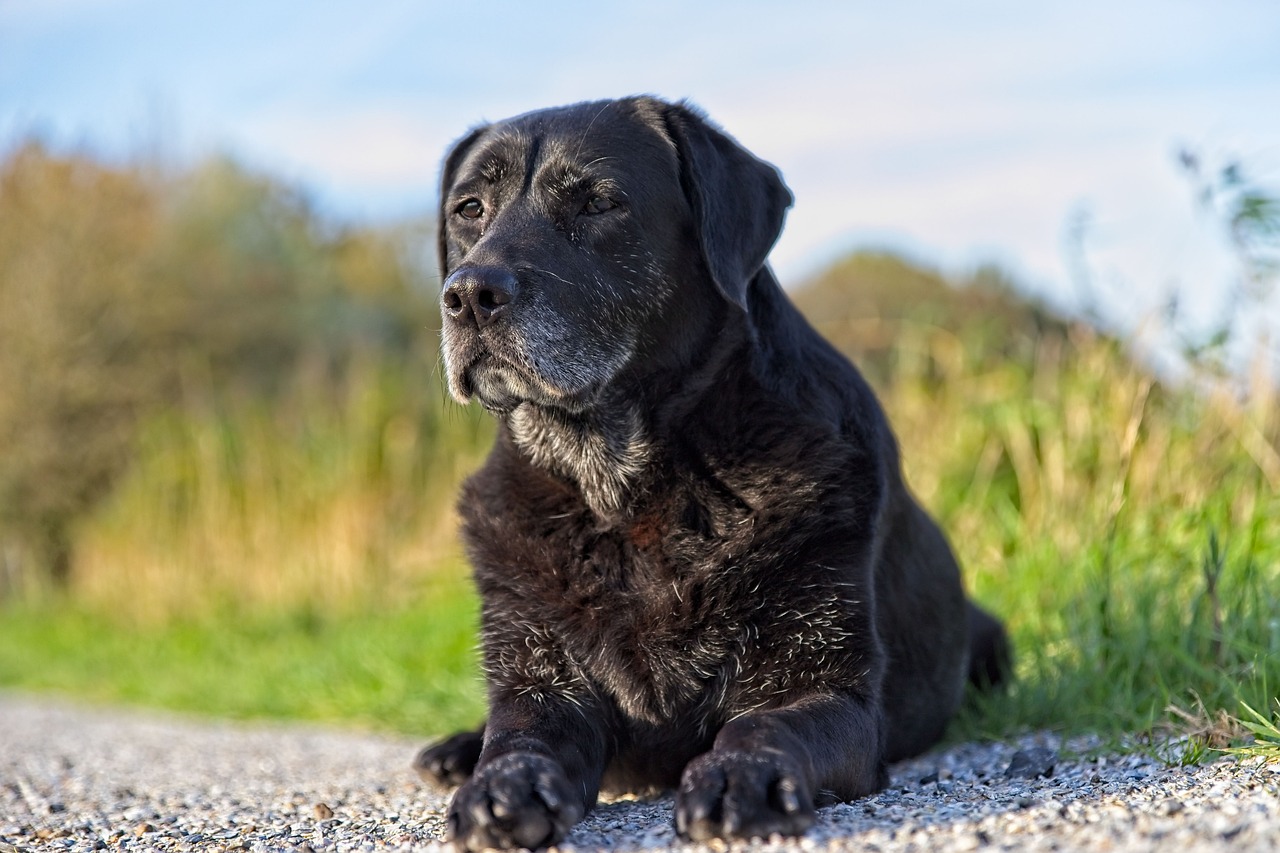
Understanding Senior Pet Needs
As our beloved pets grow older, their needs evolve in ways that can sometimes catch us off guard. Just like humans, senior pets experience changes in their physical and emotional states. Understanding these shifts is crucial for ensuring that they continue to lead happy, healthy lives. It’s not just about keeping them fed and sheltered; it’s about recognizing that they may require more attention, comfort, and care than they did in their younger years.
One of the most significant changes is in their **mobility**. Many senior pets develop arthritis or other joint issues, making it challenging for them to move around as freely as they once did. This can lead to a reluctance to engage in activities they used to love, such as playing fetch or going for long walks. Therefore, it’s essential to observe your pet's behavior closely. Are they hesitating to jump onto their favorite spot? Are they struggling to climb stairs? These signs indicate that their bodies are changing, and adjustments to their daily routines may be necessary.
Additionally, senior pets often experience changes in their **senses**. Their eyesight and hearing may diminish, making them more susceptible to anxiety and confusion, especially in unfamiliar environments. Imagine how disorienting it must be for them! A once-familiar living room can feel daunting when the shadows shift or sounds become muffled. To help them cope, consider creating a familiar environment filled with comforting scents and sounds. This can be as simple as keeping their favorite blanket nearby or playing soft music to soothe them.
Another vital aspect to consider is their **emotional well-being**. Just as we face emotional challenges as we age, so do our furry friends. Senior pets may experience feelings of loneliness, especially if they’ve lost companions or if their human family members are away for long periods. Providing companionship through gentle interaction, whether it’s cuddling on the couch or simply sitting near them, can significantly enhance their emotional health. It’s often the little things that make a big difference!
Moreover, dietary needs change as pets age. Many senior pets require specialized diets to address issues like obesity, dental health, or digestive problems. Regular consultations with your veterinarian can help you navigate these changes effectively. They can recommend specific foods that cater to your pet's unique health conditions, ensuring they get the nutrients they need while maintaining their energy levels.
In summary, understanding the needs of senior pets is about being observant and responsive. It’s about creating an environment that accommodates their physical limitations, emotional needs, and nutritional requirements. By doing so, you’re not just enhancing their quality of life; you’re also deepening the bond you share with them. After all, they’ve been there for you through thick and thin, and now it’s your turn to be their rock.

Creating a Comfortable Environment
Creating a comfortable environment for your senior pet is not just about aesthetics; it's about ensuring their well-being and happiness during their golden years. As pets grow older, they can become more sensitive to their surroundings, making it essential to adapt their living space to meet their changing needs. Imagine yourself in a cozy, familiar room where everything is within reach and the ambiance is peaceful—this is exactly what we want for our furry friends!
One of the first things to consider is their sleeping arrangements. Senior pets often suffer from joint pain and discomfort, making a comfortable bed vital. Orthopedic beds are an excellent choice, as they provide the necessary support for aching joints. You can also add soft, warm blankets to create a cozy nook where they can snuggle up and feel safe. Think of it as creating a little sanctuary just for them.
When it comes to adjusting sleeping arrangements, location is key. Placing their bed in a quiet corner away from high traffic areas can help them feel more secure. Additionally, ensure that their sleeping area is easily accessible, especially if they have mobility issues. A bed raised slightly off the ground can make it easier for them to get in and out without straining themselves.
Another crucial aspect of creating a comfortable environment is minimizing noise and disturbances. Senior pets can become increasingly sensitive to loud sounds, which can lead to anxiety and stress. Consider soundproofing their area with heavy curtains or placing their bed in a room that is more isolated from household noise. You might even want to play soft music or use white noise machines to create a soothing atmosphere.
Accessibility is paramount for senior pets. You want to ensure that their essentials, such as food, water, and litter boxes, are easy to reach. This simple adjustment can significantly reduce their stress levels. For instance, if your pet has trouble bending down, consider using elevated food and water bowls. Also, keep their litter box in a familiar, easily accessible location to encourage independence.
Furthermore, consider the layout of your home. If there are stairs, think about whether your pet can navigate them comfortably. You might even want to create a designated space on the main floor to keep everything they need within reach. This approach not only promotes their independence but also provides them with a sense of security.
In summary, creating a comfortable environment for your senior pet involves thoughtful adjustments to their sleeping arrangements, minimizing noise, and ensuring easy access to their essentials. By making these changes, you're not just enhancing their comfort; you're also enriching their quality of life. After all, a happy pet is a healthy pet!
- What are the signs that my senior pet needs a more comfortable environment? Look for signs of discomfort like difficulty getting up, reluctance to move, or changes in sleeping patterns.
- How can I help my senior pet feel more secure at home? Create a quiet space for them, minimize loud noises, and provide familiar items like their favorite blanket or toy.
- Are there specific products I should consider for my senior pet? Yes, orthopedic beds, elevated food bowls, and calming products like pheromone diffusers can be beneficial.
Adjusting Sleeping Arrangements
As our beloved pets age, their sleeping needs often change, just like how we might prefer a softer mattress as we get older. Providing a cozy, accessible sleeping area can significantly enhance their comfort and overall quality of life. Imagine coming home after a long day and having a warm, inviting spot to curl up—this is just as important for your senior pet!
One of the first steps in adjusting their sleeping arrangements is to consider orthopedic beds. These beds are designed to provide extra support for aging joints and can alleviate discomfort caused by arthritis or other age-related issues. You might think of it as a cloud for your pet, where they can rest their tired bones and recharge. Additionally, adding soft blankets can create a warm nest-like environment, making it even more inviting for them to snuggle in.
It's also essential to ensure that their sleeping area is located in a quiet, low-traffic part of your home. Senior pets can become more sensitive to noise, and a peaceful environment can help them feel secure and relaxed. You wouldn’t want to sleep in a bustling room, right? A calm space can work wonders for their sleep quality.
Accessibility is another critical factor. As pets age, their mobility may decline. Therefore, it’s vital to place their bed in an area where they can easily get in and out without straining themselves. If they have to navigate stairs or leap over obstacles, it could lead to frustration or even injury. Think of it as creating a senior-friendly haven where they can feel independent and safe.
To sum it up, adjusting your senior pet's sleeping arrangements is not just about comfort; it’s about creating a sanctuary that caters to their evolving needs. A cozy bed, a quiet location, and easy access can make all the difference in their daily lives. Remember, a well-rested pet is a happy pet!
Minimizing Noise and Disturbances
When it comes to our furry friends, peace and tranquility are key components of their comfort, especially as they enter their senior years. Just like humans, senior pets can become more sensitive to their surroundings, and loud noises or sudden disturbances can cause them a great deal of stress. Imagine how you would feel trying to relax in a bustling café—it's hard to unwind, right? Similarly, your pet deserves a quiet environment where they can feel safe and secure.
One effective way to minimize noise is by creating a designated quiet space for your pet. This could be a cozy corner of your home where they can retreat when the world gets too overwhelming. Consider using soundproofing materials, such as thick curtains or rugs, to help dampen outside noises. Additionally, you might want to invest in white noise machines or calming music specifically designed for pets. These can mask sudden sounds like thunder or fireworks, creating a more soothing atmosphere for your senior companion.
Moreover, be mindful of your household activities. If you have young children or other pets, try to establish quiet hours during which everyone can engage in calm activities. This not only benefits your senior pet but also helps foster a more peaceful home environment overall. Here are a few additional tips to consider:
- Limit exposure to loud appliances, such as vacuum cleaners or blenders, especially during your pet's resting hours.
- When hosting gatherings, consider keeping your senior pet in a separate, quieter room where they can feel more at ease.
- If your pet shows signs of anxiety during loud events, such as panting or hiding, take note and adjust your environment accordingly.
By being proactive and creating a calm atmosphere, you can help your senior pet navigate the challenges of aging with greater ease. Remember, a little consideration can go a long way in ensuring they feel secure and loved in their golden years.
Ensuring Easy Access
Ensuring that your senior pet has easy access to their essential needs is not just a matter of convenience—it's a critical aspect of their well-being. Just imagine how frustrating it must be for them to navigate a home that was once familiar but has now become a maze of obstacles. By making simple adjustments around your living space, you can significantly reduce their stress and promote their independence.
Start by evaluating the layout of your home. Are their food and water bowls in a location that’s easy for them to reach? If they have to maneuver around furniture or climb stairs, it might be time to relocate these necessities. Ideally, their feeding area should be in a quiet corner where they can eat without distractions. This not only helps them feel safe but also encourages them to eat regularly, which is vital for their health.
Next, consider the placement of their litter box or potty area. For senior pets, especially those with mobility issues, having a litter box that’s easily accessible can make a world of difference. You might want to look for low-entry litter boxes or even consider a pet door that allows them to access the outside if they prefer to do their business outdoors.
In addition to food, water, and litter boxes, think about their favorite spots for lounging or resting. If they have trouble jumping onto furniture, providing pet stairs or ramps can help them reach their beloved spots without straining themselves. A cozy bed placed in a sunny corner or near a window can also give them a sense of security and comfort.
Lastly, don’t overlook the importance of maintaining a clutter-free environment. Keeping pathways clear of toys, shoes, and other items will help your senior pet navigate their space with ease. Consider using mats or rugs that provide good traction to prevent slips and falls, as older pets may struggle with balance.
By focusing on these aspects, you can create a home environment that not only meets your senior pet's needs but also enriches their quality of life. Remember, the little things can make a big difference, and ensuring easy access to their essentials is a simple yet effective way to show your love and care.
- What are the signs that my senior pet needs easier access to essentials?
Look for signs of frustration, reluctance to move, or accidents in the house. If your pet seems to avoid their food or water bowls, it may be time to reassess their placement.
- How can I make my home more senior pet-friendly?
Clear pathways, provide ramps or stairs, and ensure that essential items are within easy reach. Also, consider using non-slip mats to prevent falls.
- Is it necessary to change my senior pet’s diet as they age?
Yes, dietary needs can change with age. Consult your veterinarian for advice on the best food options for your senior pet’s health and energy levels.
Diet and Nutrition Adjustments
As our furry companions age, their dietary needs undergo significant changes, much like how our tastes evolve as we grow older. It's essential to pay close attention to these adjustments to ensure that our senior pets are getting the right nutrition to support their health and vitality. Just like a fine wine that requires the perfect pairing to enhance its flavor, senior pets need tailored diets to keep them thriving.
One of the first steps in adjusting your senior pet's diet is to consult with a veterinarian. They can provide valuable insights into your pet's specific health needs, including any chronic conditions that may require special dietary considerations. For instance, pets with arthritis may benefit from diets rich in omega-3 fatty acids, which can help reduce inflammation and improve joint health. Similarly, pets with kidney issues might need a diet lower in protein and phosphorus. Understanding these requirements is crucial for maintaining your pet's energy levels and overall well-being.
When selecting food for your senior pet, look for high-quality ingredients that are easy to digest. Many commercial pet foods are now specifically formulated for senior pets, providing balanced nutrition tailored to their unique needs. These foods often contain added vitamins and minerals that can support cognitive function and immune health. Additionally, you might want to consider incorporating wet food into their diet. Not only is it easier to chew for pets with dental issues, but it also helps keep them hydrated, which is essential as older pets can be prone to dehydration.
Another important aspect of their diet is portion control. As pets age, they may become less active, leading to potential weight gain. It's vital to monitor their weight and adjust their food intake accordingly. You can create a simple feeding schedule to help manage their portions effectively. Here’s a quick table to help you understand the ideal feeding practices for senior pets:
| Feeding Time | Recommended Portion | Notes |
|---|---|---|
| Morning | 1/2 of daily intake | Consider adding wet food for hydration |
| Evening | 1/2 of daily intake | Monitor for weight changes |
Lastly, don't forget to keep an eye on any changes in your pet's eating habits. If they suddenly lose interest in food or seem to struggle while eating, it could be a sign of underlying health issues. Regularly assessing their dietary needs and making necessary adjustments can significantly enhance their quality of life during their golden years. Remember, a well-fed pet is a happy pet!
- What should I look for in senior pet food? Look for high-quality ingredients, balanced nutrition, and formulas specifically designed for senior pets.
- How can I tell if my senior pet is overweight? You can tell if your pet is overweight if you can’t feel their ribs easily or if they have difficulty moving around.
- Should I consult a vet before changing my pet's diet? Yes, consulting a veterinarian is crucial to ensure the diet meets your pet's specific health needs.

Regular Veterinary Check-ups
Routine veterinary visits are crucial for monitoring the health of senior pets. Just like humans, our furry companions also need regular check-ups to catch any potential health issues early on. As pets age, they become susceptible to various health problems, including arthritis, diabetes, and dental diseases. By maintaining a consistent schedule of veterinary visits, you can ensure that your pet receives the necessary care and attention they deserve.
During these check-ups, your veterinarian will perform a thorough examination, which may include:
- Checking vital signs such as heart rate and temperature
- Assessing weight and body condition
- Examining teeth and gums for dental health
- Inspecting skin and coat for any abnormalities
- Listening to the heart and lungs for any irregularities
Additionally, regular check-ups allow for the monitoring of any chronic conditions your pet may have. For instance, if your senior pet has been diagnosed with arthritis, the vet can evaluate the effectiveness of their current treatment plan and make adjustments as necessary. This proactive approach can significantly enhance your pet's quality of life, helping them remain active and comfortable as they age.
Another important aspect of these visits is ensuring that your pet stays up-to-date with vaccinations and preventive care. Senior pets, just like younger ones, can benefit from vaccines that protect them from various diseases. Your vet will guide you on the appropriate vaccination schedule, which is vital for keeping your pet healthy and active.
To make the most out of your vet visits, consider keeping a health journal for your pet. Document any changes in behavior, appetite, or physical condition, and share this information with your veterinarian. This can help them provide a more accurate assessment and tailor their recommendations to meet your pet's specific needs.
In summary, regular veterinary check-ups are not just a routine; they are a lifeline for your senior pet. By prioritizing these visits, you are taking a significant step toward ensuring their longevity and well-being. Remember, a healthy pet is a happy pet, and your commitment to their health will pay off in the form of a joyful companion by your side.
- How often should I take my senior pet to the vet?
It's generally recommended to take senior pets (over 7 years old) for a check-up at least twice a year, but your vet may suggest more frequent visits based on your pet's health. - What should I expect during a senior pet check-up?
Expect a complete physical examination, discussions about any health concerns, and recommendations for vaccinations and preventive care. - Are there specific tests for senior pets?
Yes, your vet may recommend blood tests, urinalysis, or imaging tests to check for underlying health issues that are more common in older pets.
Vaccinations and Preventive Care
When it comes to our beloved senior pets, are not just routine tasks; they are lifelines that can significantly impact their health and longevity. As pets age, their immune systems may weaken, making them more susceptible to various diseases. This is why maintaining a regular schedule of vaccinations is crucial. It’s important to consult with your veterinarian to develop a tailored vaccination plan that fits your senior pet's specific needs.
Preventive care goes beyond just vaccinations. It encompasses a range of health check-ups and screenings that can help catch potential health issues before they escalate. For example, regular blood tests can reveal underlying conditions such as kidney disease or diabetes, which are common in older pets. By identifying these issues early, you can work closely with your vet to implement effective management strategies, ensuring your furry friend remains comfortable and healthy.
Here are some key aspects of vaccinations and preventive care for senior pets:
- Core Vaccinations: These are essential for all pets, regardless of age. They protect against serious diseases like rabies, distemper, and parvovirus.
- Non-Core Vaccinations: Depending on your pet's lifestyle and environment, your veterinarian may recommend additional vaccines, such as those for Lyme disease or kennel cough.
- Regular Health Screenings: These should include dental check-ups, weight assessments, and blood work to monitor organ function.
- Parasite Prevention: Flea, tick, and heartworm prevention is crucial, as senior pets may be more vulnerable to infestations and infections.
It's also worth noting that the frequency of vaccinations may change as pets age. Your veterinarian can help determine a schedule that balances protection with your pet's health status. For example, some vaccines may only be given every three years instead of annually for senior pets. This tailored approach not only safeguards their health but also minimizes unnecessary stress and discomfort.
In summary, keeping up with vaccinations and preventive care is an essential part of caring for your senior pet. By being proactive and working closely with your veterinarian, you can help ensure that your furry companion enjoys their golden years in the best possible health. Remember, a healthy pet is a happy pet!
Here are some common questions pet owners have regarding vaccinations and preventive care for senior pets:
- How often should my senior pet be vaccinated? - It varies based on the pet's health and lifestyle. Consult your veterinarian for a personalized schedule.
- Are there any side effects to vaccinations in older pets? - While side effects are rare, some pets may experience mild reactions. Always monitor your pet after vaccinations and report any concerns to your vet.
- What preventive care is essential for senior pets? - Regular check-ups, dental care, and parasite prevention are vital components of preventive care.
Managing Chronic Conditions
As our beloved pets age, they may develop a variety of chronic conditions that can impact their quality of life. These conditions can range from arthritis and diabetes to heart disease and kidney issues. Understanding how to effectively manage these chronic ailments is crucial for ensuring your senior pet remains comfortable and happy. It's like being a caretaker for a wise old sage; you need to be attentive, compassionate, and proactive in addressing their needs.
First and foremost, regular veterinary check-ups are essential. Think of your vet as the captain of your pet's health ship, guiding you through the turbulent waters of aging. During these visits, your veterinarian can assess your pet's overall health, adjust medications, and recommend dietary changes tailored to their specific conditions. For instance, if your furry friend suffers from arthritis, your vet might suggest anti-inflammatory medications or joint supplements to alleviate discomfort.
In addition to medication, diet plays a significant role in managing chronic conditions. A balanced diet can be the difference between a sluggish pet and one that still has a spring in their step. Many senior pets benefit from special diets designed to support their health needs. For example, low-fat diets may be recommended for pets with pancreatitis, while high-fiber diets can aid in managing diabetes. Consulting with your veterinarian about the best nutritional options for your pet is crucial.
Another important aspect is exercise. While it may seem counterintuitive, regular, gentle exercise can actually help manage many chronic conditions. Think of it as a way to keep the gears of their body well-oiled. Short, leisurely walks or gentle play sessions can help maintain mobility and prevent obesity, which is often a concern for senior pets. Always tailor the exercise routine to your pet's energy levels and physical capabilities to avoid overexertion.
Moreover, creating a supportive home environment can significantly alleviate the challenges posed by chronic conditions. For example, consider using ramps to help your pet access their favorite spots without straining their joints. Orthopedic beds can provide additional comfort and support, making it easier for them to rest without discomfort. It's all about making their surroundings as accommodating as possible.
Lastly, don't underestimate the power of love and attention. Spending quality time with your senior pet can boost their mood and help them feel secure. Whether it's snuggling on the couch or engaging in their favorite activities, your presence is a comforting reminder that they are cherished. Remember, managing chronic conditions is not just about medical care; it's also about emotional support and companionship.
- What are common chronic conditions in senior pets?
Common chronic conditions include arthritis, diabetes, kidney disease, and heart disease. - How often should I take my senior pet to the vet?
It's recommended to have veterinary check-ups at least twice a year for senior pets. - Can diet help manage my pet's chronic conditions?
Yes, a proper diet can significantly impact the management of chronic conditions. Consult your vet for tailored dietary recommendations. - What type of exercise is suitable for senior pets?
Gentle, low-impact exercises such as short walks or light play are ideal for senior pets.
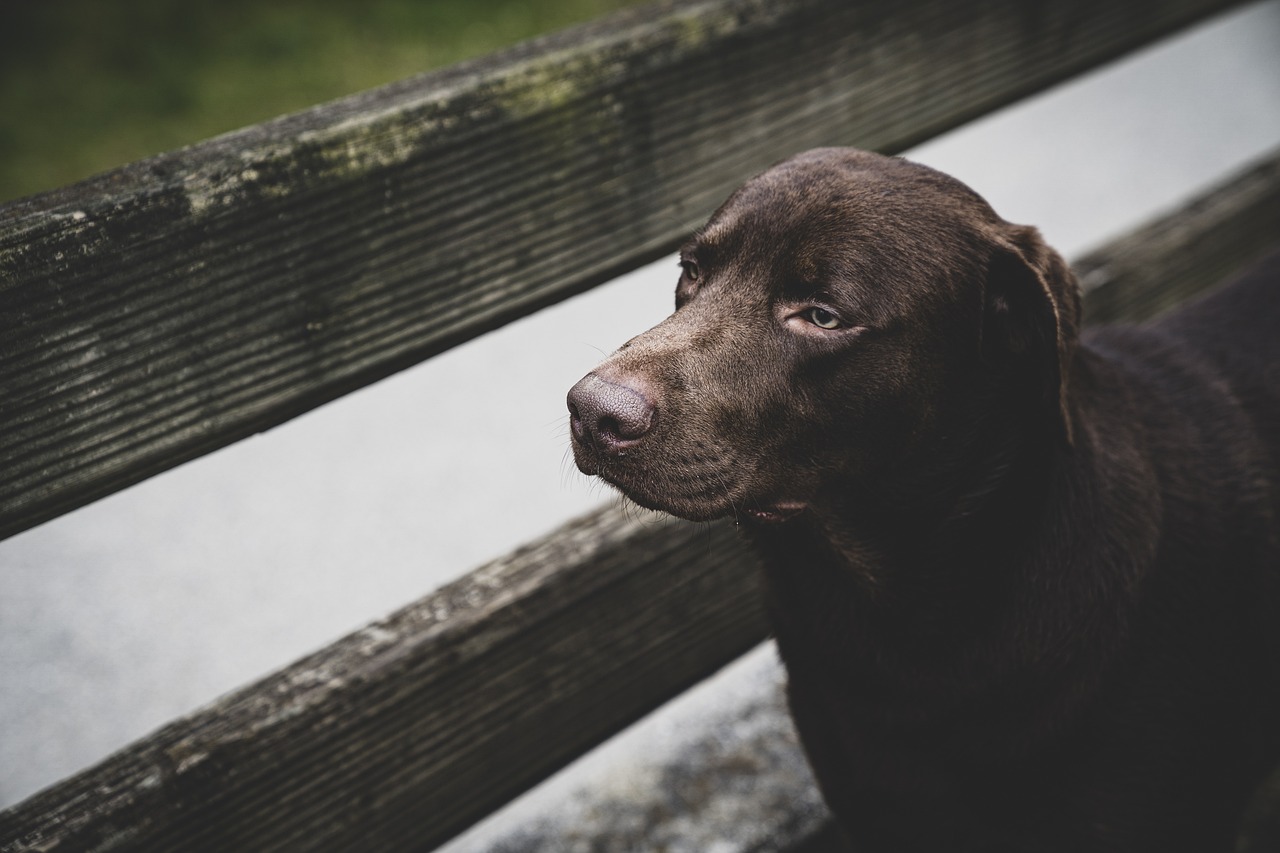
Enhancing Mental Stimulation
As our beloved furry companions age, it's essential to recognize that their mental faculties may not be as sharp as they once were. Just like humans, senior pets can experience cognitive decline, which can lead to confusion, anxiety, and even depression. Therefore, is vital for keeping their minds active and engaged. Think of it as a workout for their brains—just as we need physical exercise to stay fit, our pets also require mental challenges to thrive.
One of the best ways to provide mental stimulation is through interactive toys and games. These can range from simple puzzle feeders that require your pet to figure out how to access treats, to more complex toys that involve multiple steps to achieve a reward. Not only do these toys keep your pet entertained, but they also encourage them to think critically and solve problems, which can be incredibly rewarding for them. Imagine your pet's excitement as they paw at a toy, finally uncovering the hidden treat! It's like a mini treasure hunt right in your living room.
In addition to toys, incorporating new activities into their daily routine can significantly enhance mental stimulation. For example, consider taking your senior pet on a new walking route. A change of scenery can ignite their curiosity and encourage them to explore new smells and sights, making the walk more exciting. You might also introduce short training sessions, teaching them simple commands or tricks. Not only does this provide mental engagement, but it also strengthens your bond with your pet. Remember, a few minutes of training can be more beneficial than hours of mindless activity.
Another effective method to stimulate your senior pet's mind is through social interaction. Engaging with other pets or people can provide a fresh perspective and new experiences. If your pet is sociable, consider organizing playdates with other friendly animals, or simply inviting friends over to interact with them. This socialization can help combat feelings of loneliness that may arise as they age, keeping their spirits high and their minds sharp.
For those who prefer a more structured approach, you might want to create a mental stimulation schedule. This could include a mix of activities such as:
- Daily puzzle toys
- Short training sessions
- New walking routes
- Playdates with other pets
By varying the activities, you keep things fresh and exciting for your senior pet, which can make a world of difference in their overall happiness and health.
Lastly, establishing a consistent routine can also provide comfort and stability. Senior pets thrive on familiarity, and a predictable schedule can help reduce anxiety during times of change. By incorporating mental stimulation into their daily routine, you not only enhance their cognitive abilities but also create a sense of security that they can rely on. It's like giving them a comforting blanket of predictability in a world that can sometimes feel overwhelming.
Q: What are some signs that my senior pet needs more mental stimulation?
A: Look for signs such as increased lethargy, disinterest in activities they once enjoyed, or destructive behavior. If your pet seems bored or restless, it may be time to introduce new mental challenges.
Q: How often should I engage my senior pet in mental activities?
A: Aim for at least 15-30 minutes of mental stimulation daily, broken into shorter sessions. This can include interactive toys, training, or new experiences.
Q: Are there specific toys recommended for senior pets?
A: Yes! Look for soft, easy-to-handle toys that are not too challenging but still provide some level of engagement. Puzzle toys that dispense treats are particularly effective.
Q: Can mental stimulation help with my pet's anxiety?
A: Absolutely! Engaging your pet's mind can reduce anxiety by providing distractions and a sense of purpose. It helps them focus on tasks rather than their worries.
Interactive Toys and Games
This article explores various strategies to support senior pets during significant life transitions, ensuring their comfort, health, and well-being as they navigate aging and changes in their environment.
As pets age, their physical and emotional needs evolve. Recognizing these changes is crucial for providing appropriate care and support to enhance their quality of life during their senior years.
A safe and comfortable living space is essential for senior pets. Simple adjustments can make a significant difference in their daily lives, helping them feel secure and at ease in their surroundings.
Providing a cozy, accessible sleeping area can help senior pets rest better. Consider orthopedic beds or blankets to support their joints and ensure they have a quiet place to retreat.
Reducing loud noises and disturbances can help create a peaceful environment for senior pets, who may become more sensitive to sounds as they age.
Make sure food, water, and litter boxes are easily accessible to senior pets. This reduces stress and encourages them to maintain their independence and comfort.
As pets age, their dietary requirements may change. Consulting with a veterinarian about appropriate nutrition can help manage health issues and maintain their energy levels.
Routine veterinary visits are crucial for monitoring the health of senior pets. Regular check-ups can help detect potential issues early and ensure they receive appropriate care.
Keeping up with vaccinations and preventive care is essential for senior pets. This helps protect them from diseases and ensures they remain healthy and active.
Many senior pets face chronic health issues. Understanding how to manage these conditions can significantly improve their quality of life and comfort as they age.
Mental stimulation is vital for senior pets to keep their minds sharp. Engaging activities can help reduce anxiety and improve their overall well-being during life transitions.
Interactive toys and games are not just a source of entertainment; they are essential tools for keeping your senior pet's mind active and engaged. Think of these toys as the mental gym equipment for your furry friend. Just like humans, pets need to exercise their brains to stave off boredom and anxiety. When choosing interactive toys, look for options that challenge your pet while being easy on their aging bodies. For instance, puzzle feeders can stimulate their problem-solving skills while rewarding them with a tasty treat.
Here are some popular types of interactive toys you might consider:
- Puzzle Toys: These require your pet to figure out how to get to the treats inside, providing both mental and physical stimulation.
- Interactive Ball Launchers: These can help keep your senior pet active without requiring you to throw the ball yourself.
- Electronic Toys: Battery-operated toys that move or make sounds can pique your pet's interest and encourage play.
Moreover, setting aside time each day to play with your senior pet can strengthen your bond and provide them with the mental exercise they need. Think of it as a shared adventure where you both benefit—your pet gets to play, and you get to enjoy their joyful antics. Remember, the goal is to keep their minds sharp while ensuring they have fun, so watch for signs of fatigue and adjust the intensity of play accordingly.
Establishing a consistent routine can provide comfort and stability for senior pets. Familiar schedules help reduce anxiety and make life changes easier for them to navigate.
Q: How often should I engage my senior pet with interactive toys?
A: Aim for short sessions of 10-15 minutes a few times a day. This keeps them engaged without overwhelming them.
Q: Can interactive toys help with anxiety in senior pets?
A: Yes! They provide mental stimulation that can distract from anxiety and help keep your pet calm.
Q: What if my senior pet is not interested in toys?
A: Every pet is different. Try various types of toys and activities to find what captures their interest. Sometimes, simple games like hide-and-seek with treats can be just as engaging!
Routine and Consistency
Establishing a consistent routine is like creating a comforting rhythm in your senior pet's life. Just like humans, pets thrive on familiarity, and having a predictable schedule can significantly reduce their anxiety during times of change. Imagine how you feel when you wake up to the same sounds and sights every day; it brings a sense of security, right? For your furry friend, this sense of routine can be just as vital.
Start by setting regular times for meals, walks, and play. This not only helps maintain their physical health but also gives them something to look forward to each day. For instance, if you always feed them at 8 AM and take them for a walk at 5 PM, they’ll begin to anticipate these activities, which can help them feel more secure in their environment. It's like clockwork for them, and they will come to rely on it.
Furthermore, consistency in the way you interact with your senior pet is equally important. Use the same commands and cues during training or playtime. This repetition reinforces their understanding and builds confidence. For example, if you always use "sit" when you want them to settle down, sticking to that command helps them know exactly what you expect. It’s a small gesture that can have a big impact on their comfort level.
Additionally, consider the physical environment. If you’ve recently moved or made changes to your home, try to keep their favorite spots the same. Whether it’s their bed, food bowl, or play area, maintaining these familiar locations can help ease the transition. If you must change their environment, do it gradually. This allows them to adapt without feeling overwhelmed, much like how we would prefer to adjust to a new job or home over time.
To further illustrate the importance of routine, here’s a simple table showing how daily consistency can benefit your senior pet:
| Activity | Suggested Time | Benefits |
|---|---|---|
| Feeding | 8 AM & 5 PM | Regulates digestion and energy levels |
| Walks | 9 AM & 4 PM | Maintains physical health and mental stimulation |
| Playtime | 2 PM | Encourages bonding and reduces anxiety |
| Quiet Time | Throughout the day | Provides rest and comfort |
In conclusion, establishing a routine for your senior pet is not just about keeping them busy; it’s about providing a sense of stability and comfort in their lives. With each predictable moment, you’re helping them navigate the changes that come with aging, and that’s a gift that can’t be measured. So, take the time to create that rhythm, and watch as your beloved companion flourishes in their golden years.
- How can I tell if my senior pet is feeling anxious? Look for signs like excessive barking, pacing, or hiding. Changes in eating habits can also indicate anxiety.
- What should I do if my pet resists routine changes? Gradually introduce changes and provide treats or praise to encourage acceptance.
- Are there specific toys that can help stimulate my senior pet? Yes! Look for interactive toys that challenge their mind without being too strenuous.
- How often should I take my senior pet to the vet? Ideally, every 6 months for check-ups, but consult your vet for personalized advice.
Frequently Asked Questions
- What are the common signs that my senior pet is experiencing stress due to life changes?
Senior pets may show signs of stress through changes in behavior, such as increased hiding, decreased appetite, or excessive vocalization. They might also exhibit physical signs like pacing or restlessness. If you notice these behaviors, it’s essential to assess their environment and routine to identify potential stressors.
- How can I create a comfortable environment for my senior pet?
To create a cozy environment, consider providing an orthopedic bed that supports their joints, minimizing loud noises, and ensuring easy access to food, water, and litter boxes. Simple changes like using non-slip mats can also help them navigate their space safely, enhancing their comfort and confidence.
- What dietary changes should I consider for my aging pet?
As pets age, their nutritional needs often change. It's crucial to consult with your veterinarian about a diet that supports their health, focusing on high-quality ingredients and appropriate calorie levels. You might also consider supplements for joint health or specific dietary adjustments to manage any chronic conditions.
- Why are regular veterinary check-ups important for senior pets?
Regular veterinary visits are vital for early detection of health issues in senior pets. These check-ups help monitor their overall health, update vaccinations, and provide preventive care. Keeping up with these appointments ensures that any potential problems are addressed promptly, helping your pet maintain a better quality of life.
- How can I keep my senior pet mentally stimulated?
Mental stimulation is key to keeping your senior pet engaged and happy. You can provide interactive toys, puzzles, and even simple games that encourage them to think and move. Establishing a routine with varied activities helps keep their minds sharp and reduces anxiety during transitions.
- What should I do if my senior pet has chronic health conditions?
Managing chronic conditions requires a tailored approach. Work closely with your veterinarian to develop a treatment plan that may include medication, dietary adjustments, or physical therapy. Regular monitoring and open communication with your vet will help ensure your pet's comfort and quality of life.



